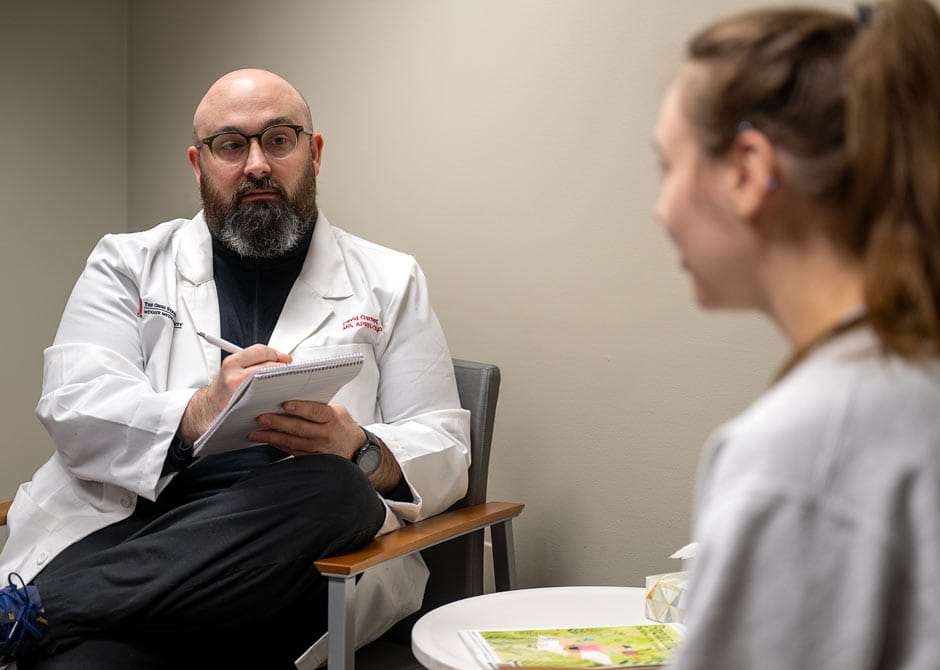If you have thoughts of harming yourself or someone else, or are in emotional distress, please call or text 988, or call 911.
When you or a loved one experiences a mental health emergency, such as suicidal thoughts or a severe psychotic episode, it can be overwhelming and difficult to know where to turn to for help.
The mental and behavioral health experts at The Ohio State University Wexner Medical Center in Columbus, Ohio, understand that time can be of the essence when you’re in crisis, and we know it takes specialized training to manage mental health emergencies.
 Our emergency departments are specially equipped to treat people dealing with an emergency mental health concern. We created Psychiatric Emergency Services (PES), which is a team of mental health doctors and providers embedded in our emergency departments, to provide crisis care to those who need it.
Our emergency departments are specially equipped to treat people dealing with an emergency mental health concern. We created Psychiatric Emergency Services (PES), which is a team of mental health doctors and providers embedded in our emergency departments, to provide crisis care to those who need it.
If you come to an emergency department at the Ohio State Wexner Medical Center or one of our other acute mental health programs, you’ll be treated with compassion, kept safe and offered expert care. We’ll talk you through what might be going on and help determine the right level of care for your condition.
How to get help in a mental health crisis
The Ohio State Wexner Medical Center has several ways to serve people experiencing an acute mental health crisis, most notably the emergency department.
Emergency Department
If you or a loved one are unable to manage the mental health condition — for example, if someone is talking about killing or harming — it’s imperative to get help immediately. Our emergency department, with Psychiatric Emergency Services (PES), is the best place to make sure you stay safe during this crisis. PES is available 24 hours a day, seven days a week.
A primary care provider, your mental health doctor or a therapist can recommend you go to the emergency department if they think your safety is a concern or you’re so disoriented you can’t function.
The emergency department can be a beneficial first step to stabilizing your condition and accessing treatment when you’re in crisis.
Behavioral Health Urgent Care
The Ohio State Harding Hospital is also home to Behavioral Health Urgent Care, which is a clinic that serves adults needing mental and behavioral health services, such as medication management or psychotherapy, bridged until they can meet with their outpatient provider. We also offer help to those needing an appointment for urgent needs.
Through our program, we provide same-day appointments and walk-in hours on certain days to serve your urgent mental health problems. Call 614-293-8295 to make an appointment.
Who can benefit from emergency mental health care
When it isn’t possible to get treatment from your private doctor or mental health center, or if the severity of your situation escalates, you might need to access emergency mental health care.
Conditions that can lead someone to the emergency room for mental health care include:
- Anxiety disorders
- Bipolar disorder
- Depression
- Panic attacks
- Post-traumatic stress disorder
- Psychosis
- Schizophrenia
- Substance use disorder
When to get emergency mental health care
Sometimes it can be difficult to know when to reach out for emergency mental health care, but it’s important not to brush off serious symptoms. It’s important to get help as soon as possible when dealing with a mental health crisis.
Some signs someone might need emergency mental health care include:
- Suicidal ideations or a suicide attempt
- Thoughts of harming yourself or others
- Hearing voices or other hallucinations
- Extreme paranoia, delusions or confusion
- Aggression or physical assault
- Unrelenting insomnia
- Severe side effects from mental health medications
- Withdrawal from alcohol or drugs
What to expect in emergency mental health services
Knowing what to expect when you come to one of our emergency departments with a mental health crisis can help make a scary situation a little less overwhelming. Here’s what an emergency mental health visit might look like at Ohio State:
- You’ll first meet with our emergency room medical staff to go over symptoms and discuss whether Psychiatric Emergency Services is needed.
- Clinicians within PES will conduct a comprehensive psychiatric evaluation that emphasizes the current crisis and whether someone is safe.
- A determination on the proper level of care will be made by these mental health experts. If someone isn’t safe or able to function on their own, PES clinicians will recommend the person be admitted for inpatient stabilization at Harding Hospital or other appropriate inpatient psychiatric facility.
- If you’re not in danger, we can discharge you to outpatient services, such as partial hospitalization, intensive outpatient or other outpatient therapies not requiring an overnight stay.
- While you’re under PES care, we’ll follow protocol to keep you safe. We’ll remove your belongings and always monitor you until your condition can be assessed.
- With your permission, we’ll make sure to keep any loved ones who accompany you to the emergency department apprised of your condition.
Other ways to get help
Besides calling 911, there are other hotlines that can help guide you in a mental health crisis that are beyond services offered by Ohio State. Helpful resources include:
- The 988 Suicide and Crisis Lifeline at 988
- National 24/7 Suicide Hotline: 1-800-SUICIDE (1-800-784-2433)
- Columbus, Ohio, Suicide Hotline: 614-221-5445
- Military Veterans Suicide Hotline: Veterans can now dial 988 and press 1 to reach the Veterans Crisis Line
- Suicide Hotline in Spanish: 1-888-628-9454
- LGBTQ Youth Suicide Hotline: 1-866-4-U-TREVOR (1-866-488-7386)
